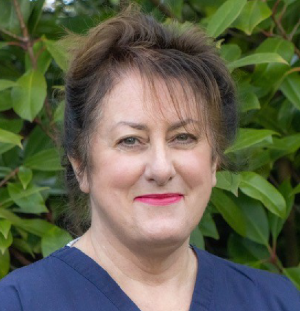Latest newsletter for midwives
Published on 10 November 2021
Find out more below
 Hear from Jane Dalton, Labour Ward Coordinator at Pilgrim Hospital, about her 40 years of experience and insight as a midwife.
Hear from Jane Dalton, Labour Ward Coordinator at Pilgrim Hospital, about her 40 years of experience and insight as a midwife.
She reflected on her career and told us about the changes to midwifery she’s seen over that time.
Midwifery is a part of my being. It’s a career I feel very honoured and proud to have been part of for over forty years. My mother started training as a state registered nurse in 1948. I admired, respected and valued her having a worthwhile career, so I followed in her footsteps.
I trained as an orthopaedic nurse, then as a registered nurse, qualifying in 1978. An expected career progression was to have a dual qualification, or in my case a triple qualification - midwifery training being the optimum choice. I qualified as a midwife in 1981 and 40 years later I remain an integral part of my team as a Labour Ward Coordinator. This is a challenging role, but my enthusiasm and love for the profession hasn’t diminished. It brings me fulfilment and pride that I can pass on knowledge and practice skills to student midwives, peers and all within the obstetric team.
My midwifery training involved a one-year training course. As a pupil midwife regulated by the Central Midwives Board, this was significantly different to current day university midwifery undergraduate study. I recall fond memories of spending three months with the same community midwife whose knowledge and practical skills remain with me today. She’s now retired, but I still regard her as my mentor.
Throughout my career, I’ve recognised that we cannot underestimate the impact we have on people’s lives. A few years ago, a lady stopped me on the street and told me I’d been at the birth of her twins 33 years ago. I felt honoured that she still recognised me. It shows what a profound effect midwives can have on women’s lives, no matter how many years pass.
Midwifery practice today is different to the early stages of my career. It was a time when record keeping was hand-written and minimal, postnatal women remained on the ward for six days, and guidelines were sparse and almost non-existent. I remember obstetricians sitting in the corner of the room while I undertook a vaginal breech birth or even delivered triplets! Babies were in the nursery at night so women had a full night’s sleep. I can still picture sitting with the lights dimmed, the smell of formula milk and staff knitting.
Society has changed since then and midwifery practice has correspondingly evolved. Women today who present with more complex physical, social and mental health needs have to be cared for collaboratively by health and care colleagues. But for every unique pregnancy and birth, we must remember the care midwives give is paramount, bringing together the art and science of midwifery.
For me, witnessing the progression of evidence-based practice and the implementation of initiatives such as Better Births, through ever increasing knowledge and research, has been fascinating to watch and adopt.
Adapting to change is inevitable. As midwives, we must implement change built on evidence-based guidelines and policy. I’ve successfully done this throughout my career. Midwifery is now a graduate profession governed by the Nursing and Midwifery Council and student midwives are taught to challenge, question and embrace change. Safety for mothers and their babies is the top priority. Therefore, we must incorporate evidence while ensuring women-centred care.
Today, I continue to practice midwifery. It's been my life-long profession and passion. I can’t fully describe how it feels to help women on their midwifery journey. Many midwives share this exceptional feeling despite the challenging and difficult times the NHS currently faces. I equally care about the midwives and other staff I work with. This can be by supporting their practice or their personal wellbeing, though the two are often entwined. I feel very proud to say that many midwives have continued in the profession with my support, encouragement, and confidence provision, during challenging times within their career. When I eventually retire, I hope this will be my legacy, next to my proudest legacy - the caring, competent and kindest clinical midwife who has followed in my footsteps - my daughter.
What else can I expect when I read this midwifery newsletter?
You can read more about what our Senior Midwifery Advisers have been up to champion midwifery across the NMC. You’ll also find the latest news on our post-registration work, updates to our education programme standards, safety in maternity care and more.
Read our latest newsletter for midwives
Sign up to keep informed
Anyone can sign up on our website to receive future issues straight to their inbox. As well as our newsletter for, there are newsletters for nurses and nursing associates, students, educators, employers, and the public.
Other recent news…
NMC publishes new holistic care resources
Published on 18 April 2024
The NMC’s latest campaign, Seeing the whole person supports better care, supports nursing professionals to continue to think holistically when providing care; t
NMC thanks Dame Ruth May for time as Chief Nursing Officer for England
Published on 16 April 2024
The Chief Nursing Officer (CNO) for England has announced that she will be retiring later this year.
Outgoing CNO Alex McMahon to lead NMC pre-registration practice learning review steering group
Published on 16 April 2024
Professor Alex McMahon, the outgoing Chief Nursing Officer (CNO) for Scotland, has been appointed as Chair of the independent steering group for our review of n






